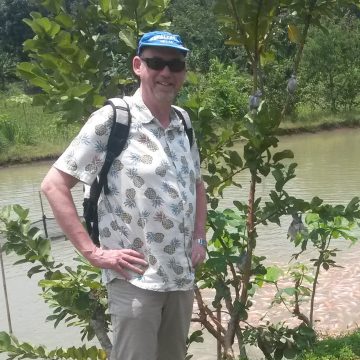“The Netherlands should reclaim pole position in the technical development of RAS aquaculture.”
Hans Komen, professor in animal breeding and genetics, has been connected to the Department of Animal Sciences at Wageningen University and Research (WUR) for over 30 years. As a professor he currently holds a personal chair at the Animal Breeding & Genomics group. Besides being the team leader in fish breeding programs and genetic diversity he is also the coordinator of the BSc minor program Wildlife biodiversity.
What type of activities does the Animal Breeding & Genomics Group deploy?
Our work is basically divided into 2 areas; contract research and consultancy. Our consulting capacity is sought by commercial companies such as Galaxidi, Keffalonia, Barramundi Asia, that wish to develop or improve breeding programs for example for tilapia, seabream and seabass. The university usually works with these companies on the basis of 3 to 5 year contracts.
The research projects in which our group participates, are usually international initiatives and involve big breeding institutes. As a partner in MedAID for example, a European research project initiated to boost Mediterranean aquaculture, we have investigated key performance indicators in seabream culture. For FishBoost we have looked at economic optimization of existing breeding programs for different fish species, and our research department has provided tools to transfer knowledge from science to industry for AquaIMPACT, an initiative aiming to integrate fish breeding and nutrition in order to increase the competitiveness of the EU’s main aquaculture species while minimizing environmental impact.
What type of students do you see nowadays? What is their future perspective?
These days, classic aquaculture students experience a lack of perspective in the Dutch aquaculture industry. In the Netherlands, the aquaculture industry is very sophisticated and ambitious, but it’s a small world. I urge these students to spend a number of years abroad to broaden their horizon.
I also see Breeding & Genetics students, who specialize themselves in aquaculture later on during their studies. These students are very valuable too. They have discovered a passion for fish and bring a lot of knowledge about animal genetics and breeding programs to the aquaculture arena.
The WUR is an active member of the Dutch Aquaculture Experts. What can your alliance mean for the aquaculture sector?
The Aquaculture and fisheries group, Wageningen livestock research and Wageningen marine research traditionally have close ties with other DAE members. Sharing our network and knowledge adds value to our clients’ projects. Together we can make a mark on the development of new advanced aquaculture technology, for example in the development of new breeds and feeds for use in RAS systems or new recirculation techniques. I believe this should be one of the common focus points of both WUR and the DAE.
RAS fits very well into a circular economy. The Netherlands were pioneers in the development of the now widely applied RAS aquaculture. Countries like Norway have invested a lot of money in the further development of RAS for salmonids. There is a tremendous amount of knowledge and ambition to do the same in our country, and to be front runners again, but lack of funds often holds us back. It would be good to redirect the attention of the DAE to the technical innovations of RAS and to reclaim pole position in its development. In this respect our membership of the DAE is an opportunity, also for DAE clients. With the scientific knowledge at Wageningen and the hands-on experience of the DAE members, we can raise the technological development of RAS aquaculture to a new level.
